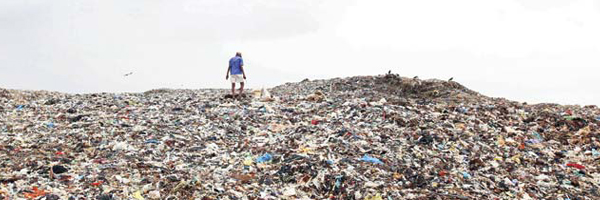10 Ways India Plans To Tackle Its Garbage Crisis

India currently generates about 62 million tonnes of solid waste annually and only about 30% or 12 million tonnes gets treated; another 31 million tonnes ends up in landfills that are already over capacity, while 19 million tonnes are left to rot where they have been thrown. And what’s worse, India’s solid waste output is expected to rise by 250% to 165 million tonnes by 2030. That is why the environment ministry’s announcement of its new ‘Solid Waste Management Rules 2016’ is so important, by focusing on eliminating this problem at its source. We bring you the highlights.
1) The new rules now cover areas beyond municipal areas to include census towns, urban agglomerations, industrial areas, religious centers, and areas under the control of the railways and defence. No person will be allowed to throw, or burn, or bury solid waste generated by them on the streets, in open public spaces, outside his premises or in drains.
2) Solid waste will now need to be sorted into wet waste which consists of biodegradable waste, dry waste which includes plastic, paper, metal and wood among others and domestic hazardous waste which includes diapers, napkins and medical waste. This will then be handed over to the local body for processing.
3) The local authorities are responsible for the development of infrastructure for collection, storage, segregation, transportation, processing and disposal of solid waste.
4) Waste processing facilities will have to be set up by all local bodies having a population of a 1 million or more within two years. In case of census towns with a population below 1 million, the setting up of common or stand-alone sanitary landfills will have to be completed in three years.
5) Residents’ welfare associations and gated communities larger than 5000 sq. meters will have to mandatorily segregate waste. New townships and group housing societies will have to develop in-house waste handling and processing facilities.
6) Bio-degradable waste should be processed, treated and disposed of through composting or bio-methanation within the premises as far as possible. Residual waste can then be handed over to the local authorities.
7) Waste generators will be liable to pay ‘user fees’ & ‘spot fines’ to local authorities for littering and non-segregation.
8) Bulk generators of garbage including hotels, institutes and events will be directly responsible for the waste they generate and will have to partner with local bodies to properly dispose of garbage.
9) The new rules also require developers of Special Economic Zones (SEZs), industrial estates and industrial parks to earmark at least 5% of the total area of the plot to build and maintain a recovery and recycling facility.
10) Manufacturers of disposable products like tin, glass, plastics will need to provide financial assistance to local authorities for the establishment of a waste-management system. If their products are in a non-biodegradable packaging, they will need to take steps to collect it once a product is sold.
Reporter : Neetika Bajaj, NDTV
Web Editor : Nikhil Narayan Sivadas, NDTV








